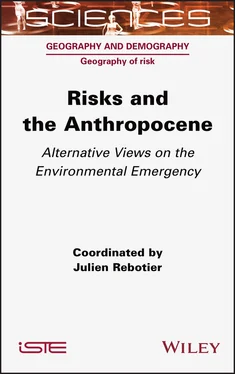– Transformations of the social: the theme of social change as a practice has sensibly receded in the research agenda (Castel and Martin 2012). Regardless of what it is called, (transformative development (Lavell and Maskrey 2014); adaptive transformation (Pelling 2010)), social change is either reduced to the inoffensive perimeter of small reformist steps (Pahl-Wostl 2009) whose modest consequences are continually promised to become significant; or it falls outside the scientific field, on the grounds that it would cover an ideological bias unacceptable in the majority representation of science (Metzger and Robert 2015). Research copes differently with this normative tension. Critical analyses identify asymmetrical development or structuring inequalities as obstacles to effective, sustainable and just improvements in risk conditions (Lavell and Maskrey 2014). The same criticisms are, nevertheless, blunted in official documents to preserve the consensus required by international institutionalization (GAR 2015). Critical thinking seems neutralized between its inclination to say things and a form of inability to change the world. In spite of the impasse, some people take up the issue of social responsibility in two ways. On the one hand, they assume that changing the world (not just making it work or describing it) is part of the mandate of research (Robbins 2004); on the other hand, they engage with other knowledge producers and with social sectors (other than those composed of scientists) that are more action-oriented (Mercer 2012; Shaw 2013). On the subject of the Anthropocene, should we dismiss the critique of capitalism on the grounds that its postponement is unrealistic (Latour 2017)? Along the narrow path that combines critique of capitalism and social transformation, some explore a movementist, collective option (Wisner 2019), which relies on critical initiatives and claims interdependencies as pledges of liberation (Moore 2017b).
Already known themes are reformulated and take on the appearance of a new terminology without any impression of significant progress. The apparent stagnation legitimately raises questions about a form of neutralization of social science questions and reflection. Clearly, the weak consequences of social science knowledge on risks and the environment would make it non-discriminating, without effect; in short, non-significant and almost useless in the wider debates (which go beyond corporations and disciplinary arenas), despite a great deal of valuable work, innovative proposals and ambitious approaches. A brief review of the difficulties in considering the issues of power around environmental problems, particularly in French geography, is enlightening in this respect.
I.3.2.2. A still difficult introduction of the environment in society
From the ranks of French geography to the arenas of globalized research, the status of the environmental question has been strongly conditioned. The Anthropocene moment seems to consolidate and even deepen the framings more than it offers real opportunities to reduce, circumvent, transform or overcome them. And this is certainly less a problem of the quality of the work than of the social conditions in which social science knowledge on risks and the environment is elaborated, produced, relayed, legitimized and appropriated (Metzger 2017).
In France, the 1990s and 2000s marked a resistance to thinking about the environment as a social issue within a geography understood as a social science (Kull and Batterbury 2017). Environmental concerns were pushed to the margins of the discipline (Pelletier 1993; Rossi 2001; Brunel and Pitte 2010), whether they blurred the more classical software of social struggles of industrial societies or compromised the scientificity of the study of natural environments that were more or less open to interactions with societies. This reluctance of some geographers to give a full place to social and political issues in environmental problems is at once symptomatic, blinding and declining:
– It is symptomatic of a modern world cornered at the threshold of upheavals it helped cause, and unable to think of itself simultaneously as an element taken in these upheavals. Tetanized by their power and its consequences which put them under obligation, modern actors evade their responsibility (Latour 1991) and try to disqualify their denigrators, who support the entry into political debate of an eminently social environmental question. The rise of the ecological question in politics, which has been growing in France since Jacques Ellul (1912–1994), Bernard Charbonneau (1910–1996) and Serge Moscovici (1925–2014), is referred to as the excesses of obscurantism – the Amish model and the oil lamp – or to the fascist threat – ayatollahs and other green Khmers (Ferry 1992; Brunel and Pitte 2010).
– It is blinding, because it masks the efforts, already mentioned, of fine integration of the natural and the social. Thinkers of the milieu 5, such as Reclus or Kropotkin (regularly mobilized today in literature on the Anthropocene), put forward an idea that is not exteriority to the social world, but rather the embodiment of reciprocal relations between societies and a natural environment (in the sense of what surrounds), whether living or not. The notion did not resist neither the regional approach, nor later the spatial turn of quantitative geography, while abandoning nuances and complexity of the idea of milieu (Robic 1992). During the 1970s, the notion of environment became institutionalized as the systemic study of a complex of interdependent societies and natural environments in the form of a geosystem structured in geography (Bertrand 1968). At the same time, national interdisciplinary scientific programs sought to combine social and physical approaches to an environmental issue that was emerging as a social issue (Tissier 1992). In spite of the resistance to make room for social questions, these two precedents (and there are many others, in a wide range from Jean Tricart to Augustin Berque) show how much what will be called environmental geography only gradually, laboriously, painfully integrates the social question.
– Finally, this resistance promises to be on the decline insofar as the stigma of a major split in the discipline (between physical geography and human geography) is pushing younger generations to defend a programmatic horizon for a radically integrated “environmental geography” (Chartier and Rodary 2016). Another informal group formed in 2016, called Cynorhodon, is, for example, behind the Critical Dictionary of the Anthropocene (Cynorhodon 2020). The spirit of the times is one of permeability between disciplines, but also between questionings, from the plural register of environmental humanities (Choné et al. 2016) to the anchoring in critical geography of a physical practice of the discipline (Di Mauro 2015; Dufour 2015; Dufour and Lespez 2019). In the wake of this new breath of environmentalism on renewed practices and issues of geography, we find the emergence in France of the scientific current of political ecology (Gautier and Benjaminsen 2012). The specificities of the corporation, the institutional structuring of the community, the proximity between geography and public policy or the development of related problematic fields (such as environmental justice) certainly contribute to explaining the late introduction in France of a current formulated in the 1970s and well established in English-language, but also Spanish-language, environmental geographies (Kull and Batterbury 2017).
Thus, the evolution of French geography with respect to the environmental question is not induced by an Anthropocene moment. Rather, it is part of the long history of a disciplinary trajectory, its structuring narratives and competing paradigms and approaches. The Anthropocene moment and its environmental emergency today (like the awareness of these issues in the 1970s) sharpen the tensions within a discipline that is constantly working, recomposing and repositioning itself. The “missed appointment” (Chartier and Rodary 2016) of an integrating environment for geography at the beginning of the 20th century could today present a new face.
Читать дальше












